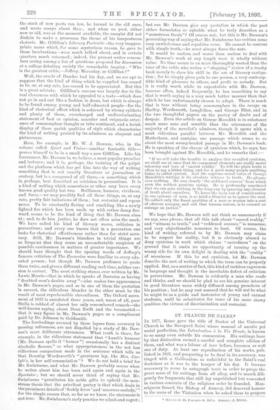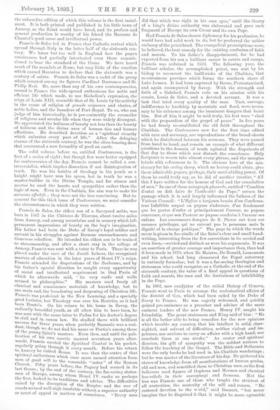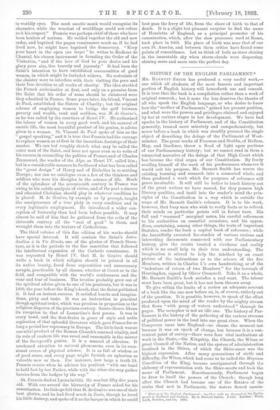ST. FRA.NOIS DE SALES.* IN 1877, Rome gave the title
of Doctor of the Universal Church to the Savoyard Saint whose manual of ascetic yet social perfection, the Introduction a in Vie Devote, is known to so many even outside his communion. His writings have by that distinction earned a careful and complete edition of them, and what was a labour of love before, becomes as well one of duty. At least one reproduction of his works, pub. lished in 1821, and purporting to be final in its accuracy, was tinged with a Gallicanism as unfaithful to the Saint's real doctrines as it was to the temper of his day. It became necessary to recur to autograph texts in order to purge the great mass of his writings from all alloy, and to search dili- gently for fragments that still lay unpublished but venerated in various convents of the religious order he founded. Mon- seigneur hoard, the Bishop of Annecy, did deserved honour to the nuns of the Visitation when he asked them to prepare
* (Eurrds do St. Francois do Saks. Annecy: 3. 1116nd.
the exhaustive edition of which this volume is the first instal- ment. It is both printed and published in his little town of Annecy, as the Saint would have loved, and its preface and general production is worthy of his friend the Baronne de • Chantal's good sense and intellectual power.
Francis de Sales led in France that Catholic revival which spread through Italy in the latter half of the sixteenth cen- tury. We know but too well in England how the pagan renaissance had partially intoxicated even those commis- sioned to bear the standard of the Cross. We have heard much of the scandals at Rome, but very little of the reaction which caused Baronies to declare that the sixteenth was a century of saints. Francis de Sales was a cadet of the group which counted among its figures Cardinal Borromeo and St. Philip Non. He, more than any of his own contemporaries, roused in France the wide-spread enthusiasm for noble and efficient life which made, to use Richelieu's expression, the reign of Louis XIII. resemble that of St. Louis by the activity in the cause of religion of grands seigneurs and clerics, of noble ladies, and the founders of Port-Royal. To us, who can judge of him historically, he is pre-eminently the reconciler of religious and secular life when they were widely divergent. He appreciated the holiness of beauty not less than the beauty of holiness and the divine uses of human ties and human affections. He described devotion as a "spiritual vivacity which animates every part of life." After the deluging storms of the sixteenth century, he was the olive-bearing dove that announced a new fecundity of good on earth.
The solid volume before us, entitled Controverses, is the first of a series of eight ; but though few were better equipped for controversies of the day, Francis cannot be called a con- troversialist, which implies dissection if not disintegration of truth. He won his battles of theology in his youth as a knight might have won his spurs, but in truth he was a master-builder in the Divine Temple, and for stones and mortar he used the hearts and sympathies rather than the logic of men. Even in the Chablais, his aim was to make his sermons affectifs ; they were not the less convincing. But to account for this thick tome of Controverses, we must consider the circumstances in which they were written.
Francis de Sales, the eldest son of a Savoyard noble, was born in 1507 in the Chitteau de Thorens, about twelve miles from Annecy, and among mountains and in scenery which left permanent impressions of beauty on the boy's imagination. His father had been the Duke of Savoy's loyal soldier and servant in his struggles against Bernese encroachments and Genevese rebellion. He intended his eldest son to be trained to statesmanship, and after a short stay in the college of Annecy, Francis was sent with a tutor to Paris. There he was -placed under the care of the Jesuit fathers, the recognised roasters of education in the later years of Henri IV.'s reign. Francis attended the disputations of the Sorbonne, and by his father's special direction he sought every opportunity of social and intellectual acquirement in that Paris, of which he afterwards said, "its very roofs and walls
seemed to philosophise." His masters used freely all classical and renaissance • materials of knowledge, but to one main end, the broadening and deepening of Christian life. Francis was proficient in the New Learning, and a specially good Latinist, but Theology was ever his Beatrice, as it had been Dante's. On his return to his home in Savoy, the radiantly beautiful youth, as all allow him to have been, he was sent with the same tutor to Padua for his doctor's degree in civil and in canon law. He studied there with brilliant success for three years, when probably Bassani° was a resi- dent, though we do not find his name or Portia's among those of the young 8aint's masters. Even then, and until the pub- lication of his own ascetic manual seventeen years after- wards, Franc is carried the Spiritual Combat in his pocket, regularly going through it every month. Before his return -to Annecy he visited Rome. It was then the centre of that spiritual enthusiasm which once more earned attention from men of good will to the venerable " notes " of the Roman Church. Fifty years before, the Papacy had seemed in its last throes ; by the end of the century, the far-seeing states- men of Europe, among whom Henri IV, ranks as perhaps the first, looked to its traditions and advice. The difficulties raised by the disruption of the Empire and the war of creeds seemed well-nigh insoluble without a superior authority or court of appeal in matters of conscience. "Every man did that which was right in his own eyes," until the theory of a king's divine authority was elaborated and gave each fragment of Europe its own Caesar and its own Pope.
Had Francis de Sales chosen diplomacy for his profession, he would have had solid work to do, but he preferred the nobler embassy of the priesthood. The evangelical prescriptions were, be believed, the best remedy for the existing confusion of faith and morals. To his father's disappointment, for he had expected from his son a brilliant career in courts and camps, Francis was ordained in 1593. The following year, the brilliant scholar, the accomplished priest, was sent by his bishop to reconvert the bailliwicks of the Chablais, that mountainous province which forms the southern shore of Lake Leman. It had been captured by Berne, Protestantised, and again reconquered by Savoy. With the strength and faith of a Galahad, Francis rode on his mission with his cousin, Louis de Sales, and a devoted servant. It was a task that tried every quality of the man. Tact, courage, indifference to hardship by mountain and flood, were neces- sary to his existence among the imminent dangers that beset him. But of him it might be said truly, his feet were "shod with the preparation of the gospel of peace." In five years he had firmly re-established the old faith throughout the Chablais. The Controverses now for the first time edited with care and accuracy, are reproductious of the broad-sheets which he distributed between his sermons. They were passed from hand to hand, and remain an example of what different questions in the domain of truth agitated the disputants of that day to those which now disturb the conscience. Holy Scripture is woven into almost every phrase, and the margins bristle with references to it. The obvious love of the mis- sionary for his erring sheep, which no heresy could abate, give these admirable papers, perhaps, their most abiding power. Of them he could truly say, as he did of another treatise, "All this I have written for the honour of God and the consolation of men." In one of these autograph placards, entitled" Combien d'estat on dolt false de l'authorit6 du Pape," occurs the passage which it is said largely influenced the fathers of the Vatican Council : " L'Eglise a toujours besoin d'un Confirma- teur Infallible auquel on puysse s'adresser, trim fondement que les portes d'enfer et principalement l'erreur, ne puysse renverser, et que son Pasteur ne puysse conduire h l'erreur ses enfans. Les successeurs donques de S. Pierre ont tons ces mesmes privileges, qui ne suivent pas la personne mais la dignito et la charge publique." The page in which the words occur is given in fac-simile of the Saint's clear and small hand- writing, interesting from the few corrections in its serried and even lines,—serried and distinct as were his arguments. It was an assertion of greater courage and importance then, than had it been made in 1870, when De llaistre, De Ronald, Lamennais and his school, had long clamoured for Papal autocracy in untimely formulas ; but it was a far-seeing theologian and statesman who could recognise, as a Catholic, at the end of the sixteenth century, the value of a final appeal in questions of faith and morals, the uses and the limitations of infallibility in the Pope.
In 1602, now coadjutor of the exiled Bishop of Geneva, Francis went to Paris to arrange the ecclesiastical affairs of the district of Gex, which had been ceded by the Duke of Savoy to France. He was eagerly welcomed, and quickly gained pre-eminence as a preacher and adviser of the more eminent leaders of the new France. Henry IV. sought his friendship. The great statesman and King said of him : "He is all the better able to bring remedies for the new opinions which trouble my country, that his intellect is solid, clear- sighted, and solvent of difficulties, neither violent and im- petuous, nor anxious to carry on affairs with a high hand, nor conclude them at one stroke." As orator and spiritual director, his gift of sympathy won the noblest natures to follow the teaching of the Gospel. The Bible and Bellarmin were the only books he had used in his Chablais wanderings ; but he was master of the literature of his day. He gathered his stores of knowledge from all manifestations of human genius, old and new, and sanctified them to Christian uses, as the first believers used figures of Orpheus and Hermes and classical bae-reliefs in their sarcophagi and frescoes. ' Not the less was Fre.. ncis one of those who taught the strictest of all austerities, the austerity of the will and reason. "He restored devotion to the vs irld," said Bossuet, "but never imagine that he disguised it that it might be more agreeable•
to worldly eyes. The most ascetic monk would recognise its character, while the weariest of worldlings could not refuse to it his respect." Francis was perhaps chief of those who have been healers of nations. He welded together the old and new order, and baptised the pagan renaissance much as, if he had lived now, he might have baptised the democracy. "Keep your heart in the open (au large)" he writes to Madame de Chantal, his chosen instrument in founding the Order of the Visitation, "and if the love of God be your desire and his glory your aim, live bravely and joyously." It had been the Saint's intention to have established communities of good women, in which might be included widows, No restraints of the cloister were to interfere with their visiting the poor and their free devotion to all works of charity. The idea startled the French ecclesiastics at first, and only on a promise from the Saint that his order of nuns should be cloistered were they admitted in France. Some years later, his friend, Vincent de Paul, established the Sisters of Charity ; but the original scheme of employing 140/12.011 to bridge the gulf between poverty and wealth, rank and serfdom, was M. de Geneve's, as he was called by the courtiers of Henri IV. He authorised the labour of women in every good work, and his manual of ascetic life, the most beautiful product of his genius, is advice given to a woman. St. Vincent de Paul spoke of him as the "gospel speaking," and it is true that Francis had the courage to replace women as at first in the immediate footsteps of their master. We can but roughly sketch what may be called the outer man of the Saint, and have not space even so to write of his success in reconciling the politics of France, and of Charles Emmanuel, the warder of the Alps, as Henri IV. called him ; but in a considerable measure he furthered what has been called the "great design" of Henry and of Richelieu in re-settling Europe ; nor can we catalogue even a few of the thinkers and soldiers who were his disciples in the science of life. Much of the splendour of the seventeenth century in France was owing to his subtle analysis of virtue, and of the part a sincere and educated Christian should play in whatever condition he is placed. M. de Geneve, by example as by precept, taught the omnipresence of a true piety in every condition and in every legitimate employment. He introduced a wider con- ception of fraternity than had been before possible. It may almost be said of him that he gathered from the evils of the sixteenth century all the soul of good" in them, and wrought them into the texture of Catholicism.
The third volume of this fine edition of his works should have special interest. It will contain the Saint's Intro- duction a la Vie Devote, one of the glories of French litera- ture, as it is the prelude to the fine sanctities that followed the intellectual expansion of the Catholic renaissance. It was requested by Henri IV. that M. de Geneve should write a book in which religion should be painted in all its native beauty, freed from superstition and unnecessary scruple, practicable by all classes, whether at Court or in the field, and compatible with the world's restlessness and the wear and tear of business. The treatise probably grew out of the spiritual advice given to one of his penitents, but it was in 1609, the year before the King's death, that the Saint published it. It had an instant success. It satisfied hearts and imagina- tions, piety and taste. it was an instruction in practical though spiritual order, which was precious in proportion to the religious disputes of the previous century. Sainte-Beuve likens its reception to that of Lamartine's first poems. It was in every hand, and the first-fruits in grace of style and noble aspiration of that splendid literature which gave France for so long a period her supremacy in Europe. The little book was an essential product of the Roman Church's renewed vitality, and its rule of modern life was sweet and reasonable in the mirror of the Savoyard's genius. It is a manual of altruism. It awakened attention to natural phenomena even in its occa- sional errors of physical science. It is as full of wisdom as of good sense, and every page might furnish an aphorism as valuable now as then. For instance, how large a truth St. Francis covers when he advises his penitent "with one hand to hold fast by her Father, while with the other she may gather berries from the hedges by the way,"
St. Francis died at Lyons in1622. He was but fifty-five years old. With one accord the hierarchy of France asked for his canonisation. Its bishops felt that M. de Geneve was one of their best glories, and he had lived much in Paris, though he loved his little Annecy, and spoke of it as the barque in which he could best pass the ferry of life, from the shore of birth to that of death. It is a slight but pleasant surprise to find the name of Henrietta of England, as a principal promoter of his canonisation, which, after the slow processes used at Rome, took place in 1663. His place of birth was near that of our own St. Anselm, and between them critics have found some points of resemblance. Let us think of both as stars shining in the immutable sky when storm-clouds were dispersing, shining more and more unto the perfect day,




































 Previous page
Previous page